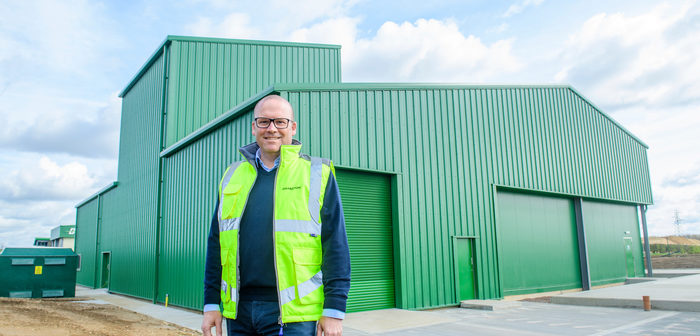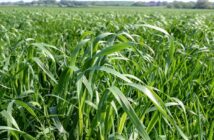Pioneering work to use potatoes to generate plant-based protein that’s ideal for vegan and vegetarian food products is being led by national potato supplier Branston in the first UK partnership with innovations company RootExtracts Ltd. Branston managing director James Truscott explains how the exciting development is helping to shape the firm’s future plans
The Branston team has dramatically improved its use of the whole potato crop over the past few years – from creating value-added prepared products using outsize tubers and peeling the ‘wonky’ ones to utilising low grade material to generate electricity in its anaerobic digestion plant. The ongoing challenge is to get the best possible value from every part of the crop from the thousands of tonnes dealt with each year, ideally retaining it within the human food chain.
And fitting perfectly with this drive to use the full harvested crop is the growing demand for UK-grown, clean-label and 100% plant-based ingredients, amid soaring sales of vegetarian and vegan food. The Veganuary movement surpassed the two million sign-up milestone this year, since it began in 2014.
Branston – one of the UK’s leading suppliers of potatoes, handling 350,000 tonnes annually – recognises the important role that extracting high grade protein from potatoes can have on the UK food industry.
Branston is preparing to launch a new £6m extraction facility – the first of its kind in the UK – at its Lincolnshire headquarters in partnership with RootExtracts Ltd, which has developed and refined the bespoke technology over the past few years.
RootExtracts Ltd has been set up specifically to focus on developing and commercialising this technology, following on from the work pioneered by B-hive Innovations Ltd. The team began working on the most effective way to extract protein from potatoes in 2013, starting from a lab-based level and gradually scaling up to a commercially-viable operation.
The new factory at the Branston site will convert secondary grade low-value potatoes into functional plant-based protein, as well as generating starch-based products for a range of manufacturing applications.
For MD James Truscott, it’s another important step in the company’s evolution and commitment to net zero carbon…
Potatoes are known as a good source of starch and fibre – and now protein too?
The amount of protein in potatoes is very low – typically only one or two per cent – but it is very high quality and nutritious, containing a full set of amino acids.
There is a massive demand for vegan and vegetarian products. While pea protein is commonly used, it is typically grown and shipped from the other side of the world, so may not have the level of traceability that UK food producers would perhaps like – as well as creating a lot of food miles.
Potato protein also has a high level of functionality which provides solutions that are fundamental to food manufacturers and aids the recipe development process. For example, it’s a good choice for vegetarian food producers looking for the same binding qualities such as eggs.
If you can generate a plant-based protein with good functionality that can be fully traceable and UK sourced and created, then you have got a very interesting product – we are extremely confident about its future success.
What currently happens to the potatoes you handle?
Growing potatoes isn’t precision agriculture – you get all sorts of different shapes and sizes from every plant due to the nature of the crop and the growing conditions. Although most of the potatoes we buy from our growers will meet the quality and size specifications for supermarket retail packs, there are still thousands of tonnes that don’t.
We have adapted our business model in recent years so that we can use much more of the crop ourselves, rather than selling it on. Potatoes that are too large or too small for fresh retail packs can be processed in our prepared foods facility into a whole range of delicious value-added ready-to-cook products. The ones that are ‘cosmetically-challenged’ – maybe oddly shaped or with a poor skin finish – can be peeled in our prepared ingredients factory to be used in ready meals or mash.
Some of the crop won’t be suitable to use in these ways. The remainder could go to our anaerobic digester (AD) plant that produces energy or be used as stock feed for animals.
It wouldn’t go to waste but our challenge over many years has been how to convert as much of the crop as possible into as high a value as possible and create an efficient and sustainable supply chain. We first started investigating protein extraction back in 2013, and our partnership with RootExtracts has really moved the technology on.
With this new process, we can gently extract the protein fraction (as well as a mixture of starch and fibre) from secondary grade potatoes and some of the by-products of our processing operations, adding significant value to our operations.
How important is it to have a sustainable supply chain and business?
Potato production has a complex supply chain – we deal with 130 growers around the country, all growing in slightly different conditions. We work with them as much as possible to plan ahead and contract their production so that they know they have a guaranteed price for the crop before it’s even planted. Because growing potatoes isn’t a precision agriculture, you have to plan for the natural variability so that you always have enough potatoes of the right type for your customers throughout the year.
For true sustainability you also need to find a good home for the crops that haven’t come out as the grower hoped. Erratic weather conditions during the growing season or exposure to pests can have a detrimental impact on the marketability of the crop, so you need to be able to deal with that.
We’ve been producing value-added potato products since 2005 and we opened the prepared foods factory at our Lincoln site in 2008. This gives us more opportunities to use more of the crop. For example, if a potato isn’t suitable for a supermarket pack, it can be peeled and used as an oven-ready roast potato.
In 2016 we opened our B2B ingredients factory. Here we can peel the thousands of tonnes of secondary product generated every year, so they are ready to be used as ingredients for convenience foods manufacturers. The protein plant is the next step in utilising every single potato and getting the best possible value from it.
We’ve always been quick to adopt sustainable practices because we believe they work for the long-term. We were early adopters of anaerobic digestion technology, we’ve used solar energy for a long time and were the first food business in the UK to be Carbon Trust accredited, way back in 2008 – it’s in our DNA.
The Veganuary organisation said more than 600,000 people were officially trying a vegan diet in January 2022, its biggest result yet. Is this market your primary target?
We’re experiencing a great deal of interest because of the vegan food element but also because of the wider food industry’s net zero aspirations. There might be a sausage manufacturer looking to reduce their carbon footprint by replacing a meat-based binding element with a vegetable one, for example, while still producing a delicious, quality sausage.
We’ve partnered with a variety of food manufacturers at various stages of this project, talking to those with plant-based products and those in the ready meal sector.
There is so much demand for potato protein. Ours has sophisticated characteristics in its purity, concentration levels and consistency in addition to the functional benefits that are crucial to food manufacturers.
We’re partnering with RootExtracts Ltd to bring our protein products to the market. It’s been a long journey from pilot plant level through to the commercial scale operation and we’re excited for the full launch this summer.
These are interesting times for traditional food manufacturers, whose teams of chefs and food scientists are almost having to relearn their trade because of the different processes involved in creating plant-based products.
What does all this mean for the future of Branston?
We are always evaluating the way we do business – discussing our values, the direction we are going in and looking back at the stories in our past that define Branston the best.
We’re not just jumping on what is happening in the market now and what might sound good in the current climate.
Building a protein extraction plant makes sense to us as our next investment and fits with our long-term direction and our commitment to being net zero by 2030. We have plenty of the raw material needed for the process and RootExtracts hasdeveloped the technology to help us get every last drop of goodness out of it.
How are the plans for the new factory?
The building is almost complete and we are finalising the design of the internal equipment. It is next to our fresh and prepared factory which means there is an abundance of raw material on hand and we’re not spending money, time – or carbon – shipping it around the country.
It’s an exciting and fun industry to be involved in. It may just be a potato but as a business it is unbelievably complex and that brings lots of enjoyment, challenges and opportunities.
The humble spud has quite a lot more to it than you might think. We love potatoes and we don’t want to waste a single one. We’ve spent years working out how to get the best out of the crops that our growers have lovingly produced and this is the next step in the journey towards zero waste.




